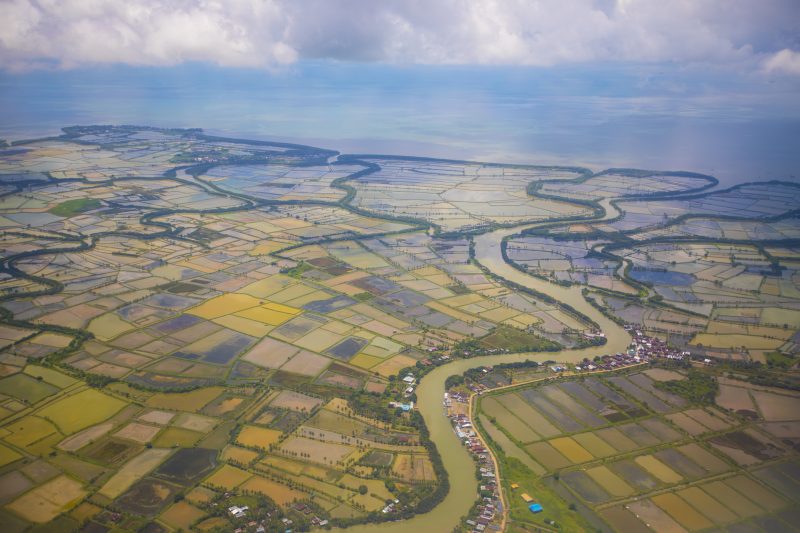
Jake Lyell for MCC
Rice fields outside Makassar, Indonesia. Preliminary modeling estimates that MCC’s investments in Indonesia are increasing economic productivity while reducing greenhouse gas emissions by up to 1 million tons of CO2-equivalent per year.
Can a global pandemic that has taken so many lives and wreaked economic havoc around the world have a silver lining? For eternal optimists like me the answer must be YES. We must have lessons we can bring into a better future. People whose exuberance exceeds mine even speak of “building forward better.”
One of my personal lessons is about nature. 2020 is the year that nature reclaimed its rightful place. The stunning pictures of the peaks of the Himalayas seen by some Punjabi residents for the first time will remain etched in my mind. Nature was also a refuge for me in this past year—walks in London’s beautiful parks and the sight of massive hundred-year-old trees were a balm for the soul.
But I don’t think that nature and humankind are doomed to a Roman Colosseum fight where only one victor can emerge. I fervently believe that a harmony can be and must be found among people, planet, and prosperity. Finding a new, sustainable equilibrium will require major change from all parts of society—governments, the private sector, and civil society.
Climate—the defining issue of our time
At MCC, we believe that climate change, poverty, and economic growth are inextricably linked. And we believe that we can and must do our part to find a new equilibrium. We are rising to the challenge—we will continue doing what we do well, and we will change what needs changing and then focus on implementing programs hand in hand with our partner countries.We know that climate change is a defining issue of our time. And we know that climate change poses the greatest risks to the developing countries, whose people, economies, and institutions are least able to afford its consequences and mitigate its devastating impact.
Floods caused by changing weather patterns mean businesses close and outbreaks of diseases like cholera are a higher risk. Drought devastates agricultural sectors, leaving people hungry and making clean water scarce. Lower headwater at hydropower plants means that they are unable to produce the electricity needed for children to study, or for vaccines to be properly stored.
If we do not rise to the existential challenge of climate change, we will see reversals of development gains and the exacerbation of global poverty and inequality in ways that will be exponentially greater than what we have seen with COVID-19.

Getting to work
MCC has a good foundation to build on. The agency was an early mover, working in critical sectors like energy, water, transportation, and agriculture to support countries’ adoption of adaptation, resilience, and mitigation measures to combat climate change.In the past five years alone, MCC has invested more than $1.5 billion, or 38 percent of our program funds, in climate-related activities.
I believe we can do even more and we must be bold
To match the urgency of the challenge, MCC made climate change a strategic priority for the next chapter of the agency. Our goal is clear: climate-smart development and sustainable infrastructure will be a priority for all departments in the agency.MCC is expanding and deepening our commitment to addressing climate change across our investment portfolio and business operations. Our new Climate Strategy builds on 17 years of development experience and significantly increases our climate ambition.
MCC commits that more than 50 percent of our program funds will be climate-related investments over the next five years. That work will include promoting low carbon development, supporting countries to transition away from fossil fuels and maintaining a coal free policy. We will also support partner countries’ efforts to meet their Nationally Determined Contributions (NDCs) under the Paris Agreement and integrate the needs of women and those most vulnerable to climate change in the designs and implementation of our investments.
MCC will also leverage its experience working on the policy front to drive policy and institutional reforms that improve transparency, promote sustainability, and enhance the protection and management of natural resources. We will support those reforms alongside sectoral, master, and investment planning to advance climate-resilient, lower-emissions development that supports partner countries as they define, strengthen, and implement their NDCs.
To ensure that climate is fully embedded in our agency, MCC economists will collaborate with the best thinkers in the field to bolster the integration of climate and environmental considerations into our analytical tools and decision making—from our constraints to growth and cost-benefit analyses to program design, implementation, and evaluation.
Finally, the development community alone will never have financing at the scale needed to meet the challenge of climate change. So, MCC will strive to catalyze private capital for climate adaptation, resilience, and mitigation. We will do this in partnership with sister agencies in the U.S. such as DFC and USAID as well as with international partners.
More broadly, partnerships with a vast network of partners—governmental, civil society and private sector—will be key to crafting a response that is robust enough and big enough to meet the scale of the challenge our of our lifetimes. With over half a billion dollars in expected investments to be signed in 2021, and up to $3.5 billion in MCC’s pipeline, MCC is well positioned to do our part.
My hope is that 2021 will be the year of resolve. Some good must come out of last year. We owe it to future generations. And as President Biden said in his opening of the Leaders Summit on Climate, acting decisively is both a moral and economic imperative.

